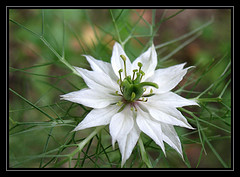
 It’s scientific name is “Nigella sativa,” and for centuries it was used in Asia, the Middle East, and Africa as an herbal remedy for respiratory health, liver and kidney function, blood pressure, and intestinal health. But could the tiny black seeds from this plant actually have an effect on cancer?
It’s scientific name is “Nigella sativa,” and for centuries it was used in Asia, the Middle East, and Africa as an herbal remedy for respiratory health, liver and kidney function, blood pressure, and intestinal health. But could the tiny black seeds from this plant actually have an effect on cancer?
Early studies show it’s possible. The seeds, known as black seeds or black cumin, have been tested in the lab and found to have powerful antioxidant and anti-cancer abilities. “Thymoquinone,” one of the constituents of the seed, was found to reduce the growth and size of tumors in rats, and Nigella sativa oil showed a protective effect against tissue damage caused by radiation. Other studies show that the oil from black cumin seeds inhibited colon cancer, and Nigella sativa extract was found in lab studies to inactivate breast cancer cells and to kill human pancreatic cancer cells.
What about the liver? Apparently thymoquinone (also known as “TQ”) showed in one study to protect the liver from toxicity, possibly because of it’s antioxidant powers. In another study, cumin was shown to protect laboratory animals from developing stomach or liver tumors. Lab studies in Saudi Arabia showed that black cumin seeds seemed to be protective against liver damage. And an herbal preparation including black cumin seeds has been recommended for cancer patients by traditional medical practitioners in Sri Lanka.
Unfortunately, studies on black cumin and cancer are limited. Initial findings are promising in that the oil, extract or TQ component could kill cancer cells or even protect healthy tissues during treatment. However, human studies, especially, are hard to come by, and scientists warn that much more research needs to take place before we can start recommending it for its anti-cancer properties.
In the meantime, if you do want to try black cumin seeds in your diet for its various health benefits, let us tell you a little more about it. The seeds have a spicy and somewhat bitter taste, and add great flavor to soups, breads, cakes, vegetables, chicken and fish dishes. You can also make a cup of soothing cumin tea by boiling the seeds in water and then letting them steep for 8-10 minutes. Black cumin may also be called blackseeds, black caraway, or black onion seeds, and they’re a great source of vitamin A, iron, potassium, fatty acids, and manganese. Some of the other health benefits reported with black cumin include boosting the immune system and easing digestive problems. In fact, many throughout the Mediterranean and Asia believe that black cumin is basically good for all kinds of health benefits! For a tasty chicken recipe, check out this one at herbies.com.
Are you convinced of the power of black cumin seed? Please let us know.
Photo courtesy pauline sirks via Flickr.com.

